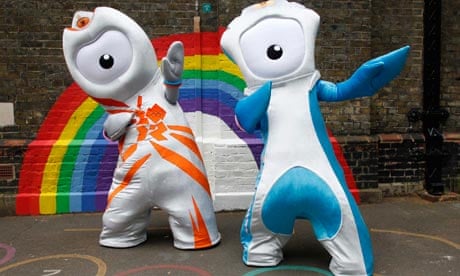The soggy jubilee bunting has barely been hauled down, but Her Majesty's subjects are already being bombarded by wall-to-wall Olympics marketing guff, plastered over hours of telly advertising, acres of billboards, and even the labels on milk bottles.
Judging by the advertising onslaught, the Olympic dream has little to do with rippling athleticism or heroic sporting endeavour, and everything to do with flogging washing powder and sausage and egg McMuffins.
Each tale of corporate absurdity – from Visa insisting that every cash machine in every Olympic venue be replaced with its own branded ATMs, to the tiny "Olympic cafe" forced to change its name lest customers queuing for a bacon sandwich confuse it with the real thing – is a reminder that, these days, putting on a major sporting event means handing over a humiliating amount of control to multinationals whose main raison d'etre is certainly not promoting sporting prowess.
Locog, the Olympic organising committee, carefully explains the quid pro quo on its website: corporate sponsors have stumped up hundreds of millions of pounds to help meet the costs of the Games and keep down the price for the taxpayer. In exchange, it agrees to ensure that they are the only people allowed to plaster the London 2012 brand on everything from shampoo to Happy Meals.
Or, as Locog puts it: "To ensure we maintain both the emotional and commercial value of the brand, we need to carefully control its use and prevent its unauthorised exploitation."
As a keen non-sports fan, I'm none too bothered about whether this corporate takeover is corrupting Olympic values – and yes, I know it's the way other major international tournaments are organised and financed too.
But the torrent of advertising may tell us something about our economy – and our society. A new book, How Much is Enough?, by Keynes biographer Robert Skidelsky and his philosopher son Edward, makes a spirited argument against blindly accepting what they call the "Faustian bargain" of contemporary capitalism.
They argue that unleashing selfish motives such as avarice and envy has always been a part of the capitalist idea. Adam Smith's notion of the "invisible hand" is at its root a suggestion that letting people pursue their own self-interest, and reap the rewards, has benefits for the rest of society.
Earlier economists, including Smith and Keynes, also concerned themselves with moral matters; but over time, the idea of channelling selfish desires to improve the common lot became lost.
Keynes imagined, in his 1930 essay Economic Possibilities for our Grandchildren, that within a century economic output would have grown sufficiently, helped by technological change, that the "economic problem" of how to satisfy the basic wants of the population with limited resources that had taxed generations of thinkers would be solved.
As the Skidelskys point out, his predictions of how rapidly output would expand were strikingly accurate. Yet instead of a contented society in which people work, as Keynes predicted, just 15 hours a week – enough to maintain them in a "good life" – we have a society in which even many top earners work 60 or 70 hours a week, barely seeing their families, so they can afford a townhouse in Kensington and a Range Rover, while those lower down the income scale have lurched into debt in order to buy flat-screen tellies and gas-fired barbecues. You don't have to be an Occupy protester to think something has gone wrong somewhere.
The Skidelskys argue that the blind pursuit of GDP growth – critical for developing economies that cannot feed their populations, but much less so for wealthy modern states like the UK – has coincided with a free-market, anti-government ideology to create an economy in which rising consumption is seen as an essential part of the recipe for progress.
Calls for us to consume less are often made on green grounds, by thinktanks such as the New Economics Foundation for example, but there is also the question that modern, mathematised economics has tended to shy away from: about what constitutes a good life – what this relentless accumulation of goods is actually for. Beyond food, clothing and shelter, what more do human beings need?
What Money Can't Buy, the latest book from Harvard philosopher Michael Sandel, raises a different, but allied concern: that money has become the dominant metric, and market mechanisms the default means of making decisions, in far too many areas of modern life.
For the Skidelskys, part of the answer must be about sharing what we have better, as well as letting go of the relentless pursuit of economic expansion for its own sake. One element of that would be curtailing the ubiquity of advertising, for example, by denying firms the right to write off the costs of advertising against their tax bill.
Deep in a double-dip recession, and five years into the worst financial crisis in a century, may seem a strange time to be advancing ideas like these: restoring growth and battling unemployment is a far more urgent priority than rewriting the rules of capitalism.
But as we rebuild our shattered economy, there's no harm in asking the question of what it is we really value, and what we are all striving for. It seems unlikely that it is being able to afford Olympic-branded razor blades, cleaning products and chips.

